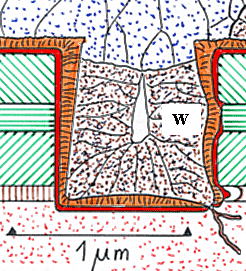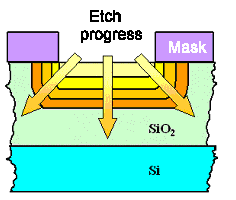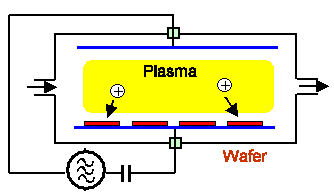 |
Structuring means selective removal of material (through a mask) by etching.
There are three main conditions for etching: | |
|
|
 |
1. Must attack material to be etched Þ
etching rate. | |
|
 |
2. Must not attack everything else Þ
selectivity. | |
|
 |
3. Must conserve structure of mask (good on left side of picture, not so good on right
side). | |
|
| |
| |
 |
Chemical etching: |
|
|
|
 |
Can be near perfect for points 1. and 2.. Example: HF attacks only SiO2
but not Si and most other materials. | |
|
 |
Fails miserably on point 3. |
|
|
 |
Underetching is unavoidable. Can't be used for lateral structure sizes < »
2 µm | |
| |
| |
| |
 |
Plasma etching ("Dry" etching) |
|
|
|
 |
In a plasma quite unusual reactions can take place - including reactions never seen in normal
chemistry. Many materials can be etched in a suitable plasma |
|
|
 |
Etching might preserve the lateral mask dimensions - for reasons not always entirely clear |
|
|
 |
There is tremendous potential in plasma etching because of the tremendously large parameter
space - and tremendous problems and costs for the same reasons |
|
|
 |
Allmost all "small" structures in semiconductor technology are obtained by plasma
etching | |
© H. Föll (Semiconductor Technology - Script)


